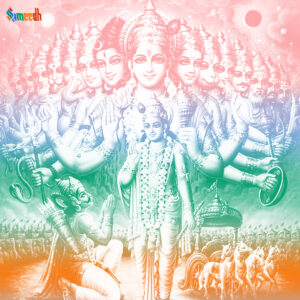In Hinduism, Devas are celestial beings considered divine and benevolent, inhabiting higher realms of existence. The term “Deva” is rooted in the Sanskrit word “div,” meaning to shine or illuminate, symbolizing the luminous and virtuous nature associated with these celestial entities.

In Hindu mythology, Devas are celestial beings or gods who inhabit the heavenly realms and are associated with virtues, light, and benevolence. The Devas are often contrasted with the malevolent Asurs, forming two distinct groups within the cosmic order.
Devas form an integral part of Hindu cosmology and are often depicted as guardians of the cosmic order, upholding righteousness (dharm), and playing essential roles in the cycles of creation, preservation, and dissolution.
The Hindu pantheon includes a diverse array of Devas, each associated with specific aspects of the natural world, cosmic forces, or divine attributes. Indra, the king of the heavens; Agni, the god of fire; Varuna, the god of water; and Vishnu ( and Avatars) and Shiv, often considered supreme deities, are among the notable Devas.
Worship of Devas is a central aspect of Hindu religious practices, with devotees seeking their blessings, guidance, and protection through rituals, prayers, and hymns. Devas also feature prominently in Hindu mythological stories, where their interactions with demons (Asurs) and humans convey moral and philosophical lessons, reflecting the eternal struggle between good and evil. Devas are generally regarded as benevolent and virtuous beings who embody positive qualities such as righteousness, wisdom, and divine grace.
Devas play significant roles in Hindu mythological stories and epics. Their interactions with Asuras, demons, and human beings often convey moral and philosophical lessons, symbolizing the eternal struggle between good and evil. The concept of Devas underscores the interconnectedness of the spiritual and material realms, providing a framework for understanding the divine order and the cosmic forces that govern the universe.